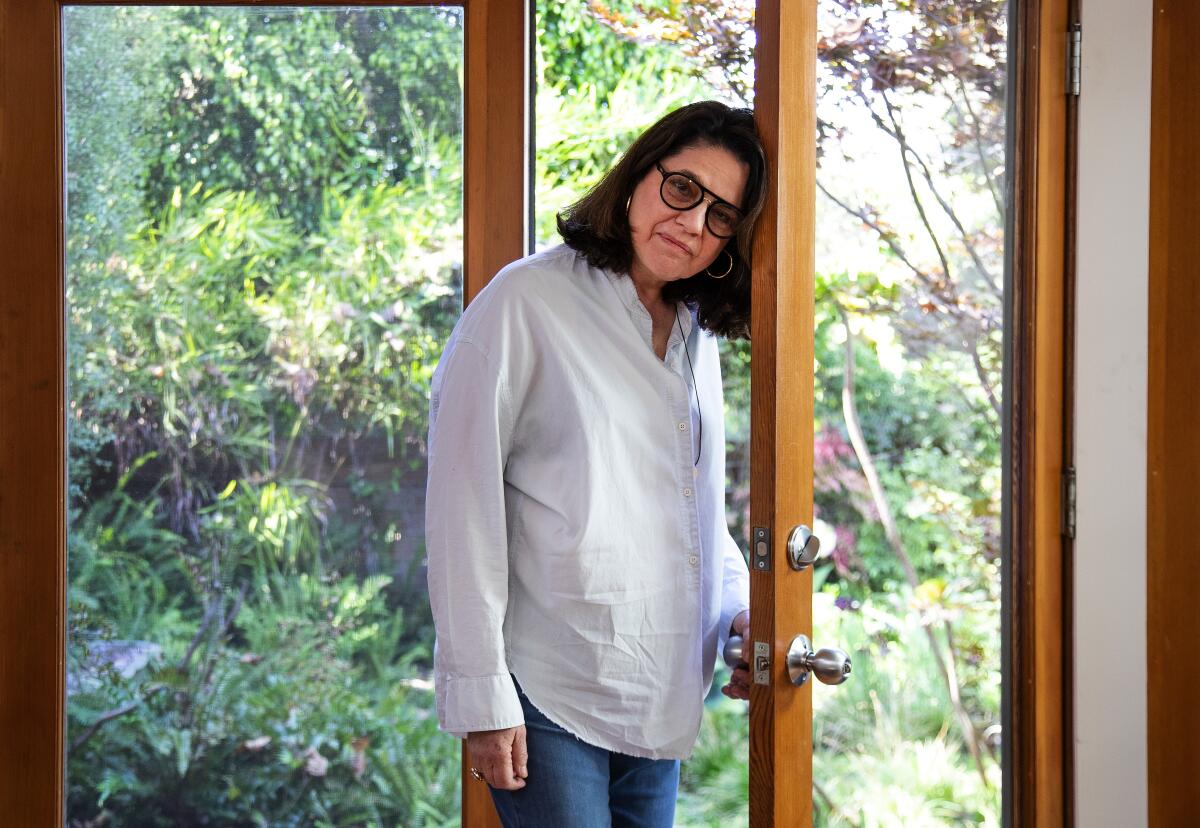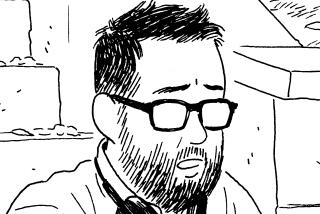Cathleen Schine’s ‘The Grammarians’ introduces rival twins obsessed with wordplay

- Share via
After the 2016 presidential election, novelist Cathleen Schine decided to take to her bed. Not for rest but to write.
The bed, according to Schine’s wry logic, is simply a better, softer desk. “It’s this huge expanse,” she says, “you have all your stuff, and there’s room for lunch.”
She wanted to write “something funny and kind of separate from the real world.” But for a year, she flailed. After 10 family-centric comic novels, including the bestsellers “The Three Weismanns of Westport,” “The Love Letter” and “The New Yorkers,” had she finally run dry?
Then Schine tapped into an endearing and slyly philosophical story that crosses the high spirit of Jane Austen with William Safire’s long-running New York Times’ “On Language” column.”
The result is “The Grammarians,” an intelligent escapist read for contentious times when the way we use words can reveal so much about our identity, our education, our worldview.
The novel’s flame-haired twins were born when someone reminded Schine of the feud between twin sisters and competing advice columnists Dear Abby and Ask Ann Landers. The Friedman women, born Pauline Esther (Abby) and Esther Pauline (Ann), were estranged for decades over professional squabbles.
Schine, no fan of the advice genre, transposed the notion of warring siblings to something she loves: grammar, the persnickety or pleasurable enforcement of linguistic order and dignity.
In exacting and good-humored prose, “The Grammarians” tracks the Wolfe twins’ cozy childhood and then their young adulthood in ‘80s Manhattan as they push the boundaries of closeness. They eventually take divergent paths: Laurel becomes a poet and Daphne is a copy editor with a popular column called “The People’s Pedant.”
After a rich career that started in 1983 with “Alice in Bed,” “The Grammarians” has earned Schine some of her strongest reviews. “I’m relieved,” she says, “because it’s a strange little book. It’s so sort of idiosyncratic and personal to me that I really wasn’t sure if anybody else would respond to it.”
On a recent day in her airy Venice home, Schine, in black-framed eyeglasses and a crisp white shirt, relaxes in an antique chair, talking about her work. The free-ranging conversation functions much like “The Grammarians.” She starts off talking about language and books, then delves into idiosyncratic and personal territory.
The focal point of “The Grammarians” — “Webster’s New International Dictionary of the English Language,” Second Edition — occupies a table next to the couch. This is the downstairs copy; Schine has another within reach of her writing bed. She’s fascinated by Webster’s history, particularly its non-pejorative treatment of slang words such as “ain’t” in the third edition published in 1961.
In “The Grammarians,” Laurel and Daphne Wolfe speak a secret twin language that unnerves their psychiatrist uncle and baffles their affectionate mother, Sally. When their father, Arthur, brings home the Webster’s New International Dictionary, the girls’ obsession with words ramps up. They record beloved oddities such as whilom (definition: former) and oxters (armpits) in a notebook, and then “played with the words as if they were toys ... involving them in intrigues of love and friendship and bitter enmity.”
Laurel, the elder by minutes, is more self-assured, but it is Daphne who finds professional success first as Standard English’s stalwart guardian. She wags her finger at the barbarians for not knowing when to use “continuous” instead of “continual.”
When asked if she’s a Laurel or a Daphne, Schine says she went back and forth. On one hand, she cringes at the incorrect usage of who instead of whom. On the other, she loves Twitter where language is regularly chewed up like taffy. The conflict between Daphne and Laurel, Schine says, is a whole worldview: “It’s authoritarianism versus nihilism … but all in this context of how we speak, and how we write and how we relate to words, and also to each other.”
Not only do Daphne and Laurel tussle over linguistics, their life choices fracture their relationship as well. When Laurel has a child and leaves her job teaching kindergarten, Daphne is appalled by her sister’s desire to be a stay-at-home mom. Laurel points out that she’s witnessing “the birth of language” right in front of her. The argument hints at an old struggle to define feminine identity: by career or children or both (and if both, how)?
Schine, now 66, has steered through several shifts in identity; some have wrenched open her worldview. Growing up in Westport, Conn., with a mother who worked (much to her father’s annoyance) and eventually got a PhD, Schine grew up privileged, thinking she “could do anything I wanted to do.”
By the time she was a freshman at Sarah Lawrence in 1971, despite protesting the Vietnam War in high school, her interest in politics had evaporated. At college, “it was all like theater and everyone was beautiful and got dressed up for dinner, and I just didn’t want any politics in my life. I just wanted to listen to ‘Cabaret’ over and over again and, you know, be divinely decadent.”
She moved to New York City, married New Yorker film critic David Denby, raised two sons and steadily published. The couple had an apartment on the Upper West Side and other signifiers of the good life, but around 2000, the two divorced amicably. Around the same time, Schine realized she was queer. In her late 40s, Schine was navigating divorce, co-parenting and a new sexual identity, all to the confusion of her elderly mother and some friends.
“A lot of people before me made it much easier [to come out]. It wasn’t like today, but it was still a big deal. People said to me, ‘Oh, do you think you’ll be invited to dinner parties anymore?’ You know, stuff like that. And I thought, ‘Well, honestly, I hate dinner parties, so fine.’”
Now married to Hollywood filmmaker-producer Janet Meyers, Schine credits the coming-out process with opening her eyes to the marginalization of others. “I always believed in the things that are the essential issues of feminism, but I didn’t make the connection really. Later, when I was coming out of the closet, I started noticing the different ways that people were unconsciously treated and that I had unconsciously thought of people.”
Schine moved to the West Coast seven years ago, though she still flies to New York nearly once a month to care for her mother. She jokes that it’ll take her another 30 years to actually set a book in L.A. and not New York. Her latest project is bubbling up, despite her disbelief.
“Wow, I’ve had 11 ideas. Why on Earth would I have 12?”
Still, something vague is itching at her. She’ll take to her bed to find out more.
Wappler is the author of “Neon Green” and a former co-host of the Pop Rocket podcast.
More to Read
Sign up for our Book Club newsletter
Get the latest news, events and more from the Los Angeles Times Book Club, and help us get L.A. reading and talking.
You may occasionally receive promotional content from the Los Angeles Times.








